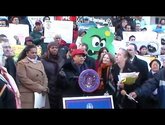Paid Sick Leave Rally Jan 18 2012
“We were here a year ago. We got close, we thought we were going to finally see passage about a year ago,” Dan Cantor, the Executive Director of the Working Family, announced. “Politics is hard, so we come back now, a year later.”
Things have changed, Mr. Cantor insisted, citing other localities that have passed similar bills, and the Occupy Wall Street protests energizing the public. Democrats also contend that both legislative tweaks and the political environment make things much more favorable for paid sick day advocates this time around than the start of 2011, when Council Speaker Chris Quinn shelved the legislation.
“I think there’s going to be enormous pressure on Christine to do something here,” a Democratic insider argued. “The compromises that the bill supporters laid out here today are pretty big. And they take away the main thing that she was hanging her defense of inaction on, that there was no carve out for small business.”
Advocates believe that an amended version of law year’s bill substantially reduces its impact on small businesses. The bill won’t apply to businesses with fewer than five employees, or new businesses with fewer than twenty. It’ll also have increased flexibility, such as allowing vacation days to count towards paid sick day requirements.
For her part, Speaker Quinn has not taken a position on the bill’s amendments but expressed her skepticism of the overarching effort. “I’ve not yet seen the full amendments … so I cannot comment on those,” she said at a press conference this afternoon. “As I said over a year or so ago … although this goal is laudable, it’s not one that I can support because I think it is one that will cost us jobs and cost us small businesses and their future in these tough economic times.”
Democrats also argue that the Paid Sick Time bill provides them a number of additional messaging advantages over their living wage fight. Notably, paid sick days are something most voters would find relatable, while the living wage legislation, affecting city-subsidized development projects, is a harder sell to the average person on the street.
“On a fundamental level, it’s just a hard one to find a good argument against,” the Democratic insider added about the new effort. “It polls very well among Democratic primary voters that are sort of up for grabs in 2013.”
Indeed, the 2013 Mayoral race is unquestionably a factor in the politics of the paid sick day bill. Speaker Quinn is a leading contender for Gracie Mansion, and two other top contenders made sure to let it be known that they firmly support the effort.
“This is a matter of profound economic urgency, especially for struggling families in the outer boroughs,” one such mayoral candidate, Public Advocate Bill de Blasio, said in a statement. “I applaud Council Member Gale Brewer and the New York Paid Leave Coalition for laying out a new compromise today that will increase productivity and help small businesses protect their bottom line. With past concerns laid to rest, we owe it to working families to act now.”
And Manhattan Borough President Scott Stringer, another likely candidate for the city’s top job, sent out a reminder that the Borough President “has been a leader in the fight to pass paid-sick leave since he assumed office in 2006,” citing statements he’s made over the years on behalf of paid sick leave legislation.

